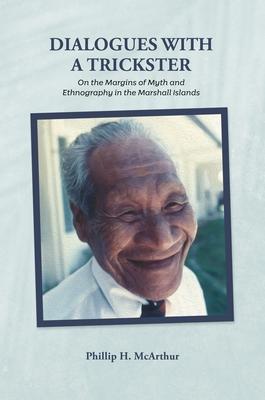"We joked often--laughed to the point of crying (that deep visceral laughter)--not just about the subversive antics of Letao, but to all the allusions to how he, my friend, and I, were tricksters in our own right, moving between our cultural worlds, illuminating ambiguities and celebrating them."
This rich, experimental ethnography plays within the margins of mythology and ethnographic practice to pursue a decolonizing method of inquiry and intercultural engagement. Through a range of mischievous narratives about the mythological trickster Letao, a riM̧ajeļ (Indigenous Marshall Islander) storyteller takes the author on a journey into a deep cosmological and epistemological past and back into the colonial and imperial present. Transcribed in this book, the simultaneously effortless and pointedly deliberate conversations between author Phillip H. McArthur and respected riM̧ajeļ elder Kometo Albōt subvert and dismantle boundaries of time, culture, and religion. Through lighthearted dialogue, Kometo explores serious histories of imperial abuse, war, atomic bomb testing, ideologies of social power, decolonization, Christianity, magic, sex, and death. He plays upon a range of ambiguities such as the slipperiness of mythic discourse, ethnographic entanglements, ambivalent analogies about Americans, cosmological musings about Western and Indigenous deities, the complexities of matrilineal kinship and modern manifestations of power, the interplay of magic within politics and religion, the social efficacy of ideologies of deception and revelation through divination, the way by which risky topics and profane stories bring the sacred into relief, and prophecies that presage the end of culture and the death of the trickster. In this way of relating, the boundaries blur between ethnographer and subject and the theories of myth and folklore--all become part of the dialogic process. The author critically attends to his positionality, as well as to how Kometo slyly positions them through his jokes and in drawing the author into trickster mythologies. Written in a narrative style that combines transcribed dialogue, poetic ethnographic descriptions, applied theory and sharp analysis, and storytelling, this book grants us insight into a decade-long friendship and honors the wisdom of a trickster.
Book
Dialogues with a Trickster: On the Margins of Myth and Ethnography in the Marshall Islands
(Write a Review)
Hardcover
$75.00
"We joked often--laughed to the point of crying (that deep visceral laughter)--not just about the subversive antics of Letao, but to all the allusions to how he, my friend, and I, were tricksters in our own right, moving between our cultural worlds, illuminating ambiguities and celebrating them."
This rich, experimental ethnography plays within the margins of mythology and ethnographic practice to pursue a decolonizing method of inquiry and intercultural engagement. Through a range of mischievous narratives about the mythological trickster Letao, a riM̧ajeļ (Indigenous Marshall Islander) storyteller takes the author on a journey into a deep cosmological and epistemological past and back into the colonial and imperial present. Transcribed in this book, the simultaneously effortless and pointedly deliberate conversations between author Phillip H. McArthur and respected riM̧ajeļ elder Kometo Albōt subvert and dismantle boundaries of time, culture, and religion. Through lighthearted dialogue, Kometo explores serious histories of imperial abuse, war, atomic bomb testing, ideologies of social power, decolonization, Christianity, magic, sex, and death. He plays upon a range of ambiguities such as the slipperiness of mythic discourse, ethnographic entanglements, ambivalent analogies about Americans, cosmological musings about Western and Indigenous deities, the complexities of matrilineal kinship and modern manifestations of power, the interplay of magic within politics and religion, the social efficacy of ideologies of deception and revelation through divination, the way by which risky topics and profane stories bring the sacred into relief, and prophecies that presage the end of culture and the death of the trickster. In this way of relating, the boundaries blur between ethnographer and subject and the theories of myth and folklore--all become part of the dialogic process. The author critically attends to his positionality, as well as to how Kometo slyly positions them through his jokes and in drawing the author into trickster mythologies. Written in a narrative style that combines transcribed dialogue, poetic ethnographic descriptions, applied theory and sharp analysis, and storytelling, this book grants us insight into a decade-long friendship and honors the wisdom of a trickster.Hardcover
$75.00